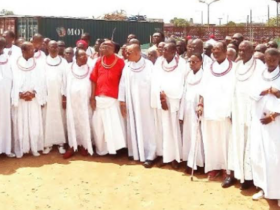The National Industrial Court,NIC, on Monday reserved it’s ruling on interlocutory application brought by the Federal government seeking an order to direct the Academy Staff Union of Universities ASUU to call off it’s seven months old strike.
Presiding judge, Justice Peter Hammam reserved the ruling after lawyer representing the federal government James K.Igwe,SAN, and the ASUU lawyer Femi Falana, SAN, argued for and against the interlocutory application.
Moving the interlocutory application, Igwe , SAN, urged the court to grant the interlocutory application and order ASUU to call off the seven months strike in the interest of justice .
He stated that the balance of convenient is on part of applicant who has also vowed to pay damages if the case proved otherwise after the hearing of the substantive suit.
The lawyer told the court that University students have lost seven months to the strike and to continue with the strike would be a continuous injury as they can not be compensated for the time waisted.
Igwe also told the court that federal government had met all conditions precedent for the grant of the interlocutory application.
Statutorily, he further submitted the Court on its own is empowered to grant the application once the matter is before it.
He urged the Court not to look at the issues raised in the substantial suit while considering the interlocutory application.
Igwe also prayed the court to discountenance the preliminary objection filed by ASSU and grant the application on the ground that the dispute was referred to the court.
But in his reply, ASUU lawyer, Femi Falana, SAN, informed the Court that the Union had filed a counter affidavit of nine paragraphs with eight exhibits. The counter affidavit was deposed to by ASUU President in vehement opposition to the interlocutory application.
Falana referred the Court to exhibits 3, a letter known as referral from the minister of Labour and Employment and observed that it was an “order from the minister to the Court to issue an order.” He submitted it that under the law, “nobody has power to so ordered the Court.”
The lawyer said that what the applicant lawyer has done in his submission was purely a request to the court to stamp an order issued by the minister.
He further noted that once a referral is before the court the applicant or claimant is limited to the issues contained in the referral . no party can go outside it, he argued.
The claimant counsel must limit his submission to the referral. But in this case he had argued an interlocutory application that contained same issue with the referral and he want the court to determine the main issues in an interlocutory stage without hearing the substantive matter.
“This application is unknown to this court ,trade dispute Act and Section 254( 6) of Nigerian Constitution, he submitted.
Falana , therefore urged court to discountenance the application adding that only individual have access to National Industrial Court, not government or union.
He said that organization, government establishment that feel aggrieved on union must go through Industrial Arbitration Panel first and if there are disagreement they can come NIC .
He maintained that the lack jurisdiction to hear the government complaint without the matter going through the arbitration. And they can not ask for injunction when they have not comply with the law.
The minister has not comply with part one of Trade Dispute Act which requires that this matter be commenced at IAP.
The court does not have jurisdiction over this matter, he submitted. Falana said that it was unfortunate that the federal government claimed urgency on a strike it allowed to drag for six months before approaching the Court.
He added that the conduct of the claimant would not permit the granting of this application after the federal government ignored two agreements it’s entered with ASUU.














